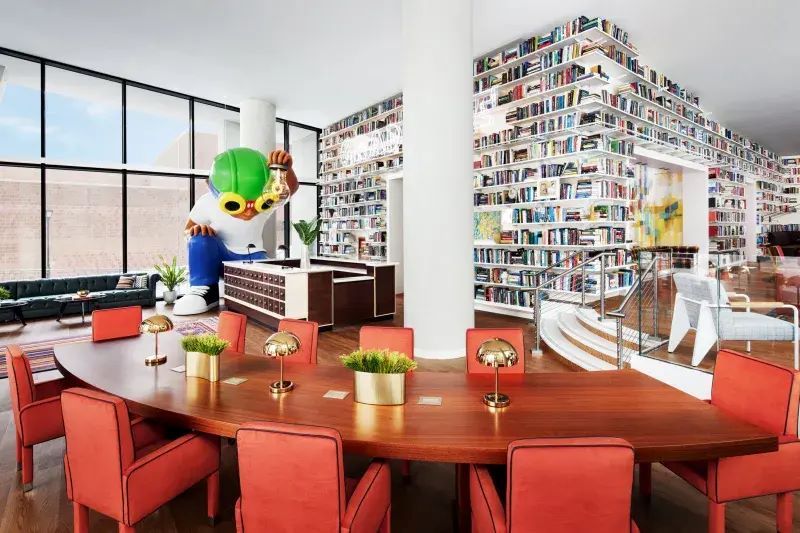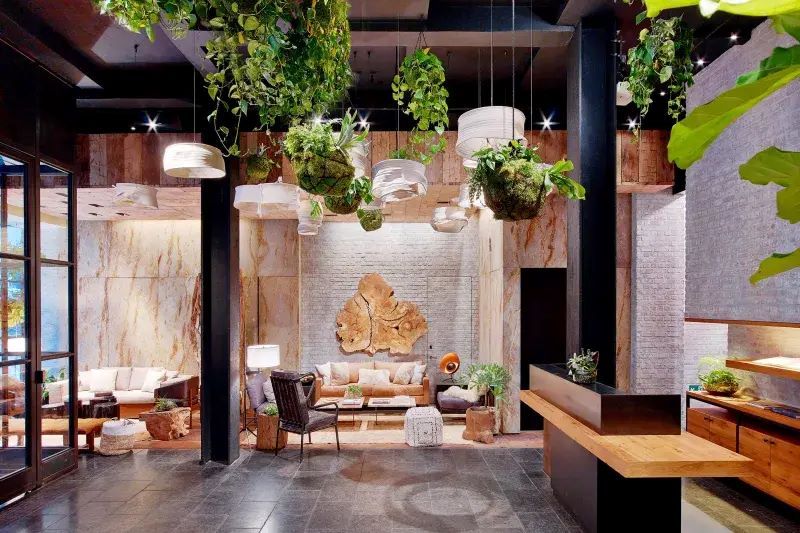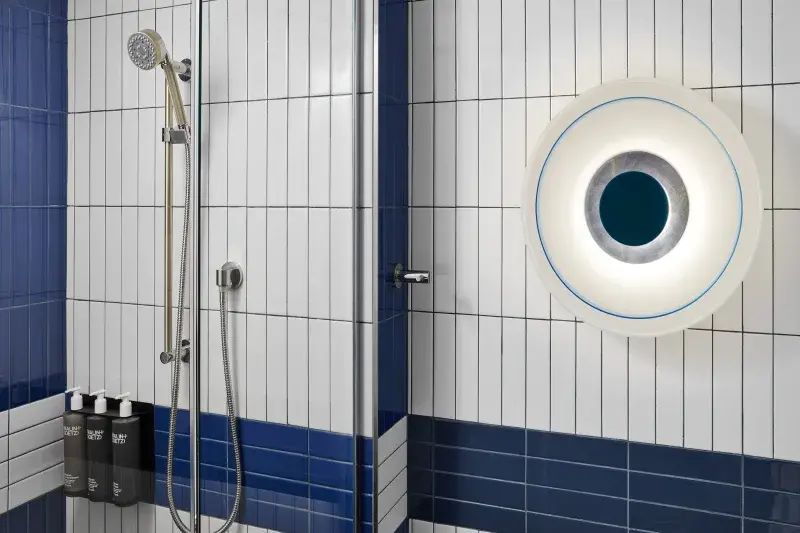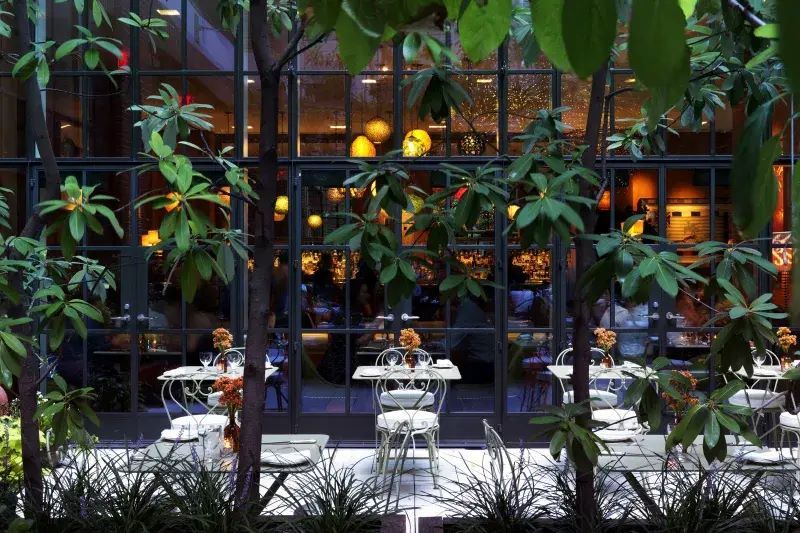Courtesy, 1 Hotel Central Park
Despite the challenges of the past year, NYC remains a hub for forward-thinking urban sustainability. While the five boroughs move ahead on ambitious climate change goals, studies increasingly show that quality of life for visitors and residents is boosted by urban, architectural and lifestyle transformations that lower greenhouse gas emissions and encourage well-being.
Many NYC hotels are helping to catalyze the trend through their commitment to the beauty and logic of the environmentally conscious paradigm. In 2021, a suite of them are making sustainability principles integral to their identities, ensuring that visitors can enjoy a stay in NYC and support a necessary shift. Here’s a look at what’s premiering as well as a sampling of legacy venues that set the bar for the new arrivals. In these hotels, sustainability offers vibrant, beautiful spaces that foster well-being and sensual comfort.

Lobby, Graduate Roosevelt Island. Photo: Steven Frehon
Graduate Roosevelt Island
22 N. Loop Rd., Roosevelt Island, Manhattan Opening in June and joining an existing eco-complex, the Graduate is located on Cornell Tech’s Roosevelt Island campus. The educational theme plays out in the lobby, an invigorating space that features 5,000 linear feet of shelves lined with books, library-style worktables and an expansive wraparound couch, in brown plaids, that nods to dorm life. A 12-foot sculpture of the character FlyBoy, by artist Hebru Brantley, kneels next to the reception desk, which incorporates a vintage apothecary cabinet. The rooms continue the theme with night tables made from flat files and blankets in collegiate plaids accenting the patchwork sensibility characteristic of undergraduate rooms; one presidential suite has an elaborately painted ceiling and carpet runners surrounding beds.
The Graduate’s eco credibility is embodied in the minimized impact of its operations and in its LEED-rated architecture, designed by the acclaimed firms Snøhetta and Stonehill Taylor with interiors by Graduate’s in-house team. The hotel’s plan for reducing resource use starts with highly efficient heating, cooling and LED lighting systems, and 70 percent of the building’s energy consumption for the next two years will be offset with wind energy. Low-flow fixtures throughout the premises ensure reduced water consumption. Showing the waste-reduction possibilities of a closed-loop approach, an impressive 82 percent of the 875 tons of waste created during construction was sorted and recycled. Beyond that, recycled materials made up a third of the construction components themselves. Vintage art and furniture contribute character throughout the spaces. Visitors can breathe easy here, since low-VOC (volatile organic compound) paints and adhesives as well as LEED-certified green cleaning products ensure healthy indoor air quality.
In the gastronomic vein, visitors can enjoy food and spirits that have been sourced locally and with low impact when possible, ranging from organic vegetables to biodynamic and regenerative viticulture wines; the hotel plans to harvest vegetables from a local garden plot. As part of its waste-reduction policies, the Graduate’s food and beverage department has eliminated single-use plastics such as food containers, water bottles and plasticware. The venue has a composting program so that food waste, even coffee grounds, will get another swing at the life cycle—as will cooking oil, thanks to waste reclamation programs.

Lobby. Courtesy, 1 Hotel Central Park
1 Hotel Central Park
1414 Sixth Ave., Midtown West, Manhattan
1 Hotel is a leading voice in the sustainable-hotel genre, and visitors can see why as soon as they arrive at the bewitching location at the corner of 58th Street and Sixth Avenue, just a block from Central Park (another outpost is in Brooklyn Heights). The hotel’s weathered-wood and glass exterior is hugged by a living wall of English ivy fed by a mile of irrigation tubes, and the main door encases a sculptural assemblage of found twigs. The biophilic design, plants and natural materials throughout the lobby, common areas and rooms give the space a rejuvenating ambiance.
Reused materials are found in abundance: the wood used in guest room walls was reclaimed from decommissioned water tanks; the hardwood flooring in the gym was saved from a school’s basketball court; and the decor features salvaged elements including bricks, marble and the lobby’s oak ceiling. Guests arriving in their rooms are greeted by a ceiling-high installation of greenery as well as organic cotton amenities covering the spectrum from mattresses to robes. The hotel employs a strict green cleaning regimen using a combination of CDC-approved products and UV sanitization, and reduces waste through its refillable toiletry dispensers. The restaurant Jams features local and organic offerings from regional farms, which also provide products for the lobby’s monthly farm stand.
1 Hotel Central Park earned a LEED certification rating through a mix of energy-efficient strategies, materials sourced regionally and guest access to EV charging stations and free bike parking. Another hotel perk: complimentary transportation via an Audi e-tron within a 15-block radius.

Courtesy, Pendry Manhattan West
Pendry Manhattan West
438 W. 33rd St., Hudson Yards, Manhattan
Pendry is another newcomer to the luxury eco hospitality space. The venue, in a building designed by the celebrated firm Skidmore, Owings & Merrill, is located in the Manhattan West development, a complex of four LEED-rated buildings that include solar panels, a rooftop apiary and a rainwater reclamation system. The Pendry has a curving, all-glass facade that lets in abundant light while protecting guest privacy through its darkened panes; the common areas and rooms, designed by the hospitality firm Gachot Studios, offer a sublime, soothing take on luxury with plenty of woods and minimalist decor. The floor-to-ceiling windows afford magnificent views of the City.
For Montage International, the parent company of Pendry, sustainability is a core principle of its hospitality approach. The hotel seeks to lower its impact by refining best practices for everything from housekeeping to waste management. In addition to its LEED specifications, the Pendry was designed to
WELL standards, which evaluate a building’s impact on numerous well-being criteria; green cleaning regimens ensure that the air, water and surfaces remain free of contaminants. Low-flow fixtures allow efficient water usage, and the building’s high-tech heating and cooling systems limit electricity consumption.

Motto by Hilton New York City Chelsea. Courtesy, Bridge Hotel Group
Motto by Hilton New York City Chelsea
113 W. 24h St., Chelsea, Manhattan
The Motto, debuting this August, takes on the environmental impact of hospitality through its small footprint model and a promise to counterbalance all the carbon emissions of its guest stays and hotel operations through the end of 2021 at least. The 200-square-foot rooms offer visitors ample space in an energy-efficient setting. By purchasing carbon offsets and verified green investments like
Gold Standard through South Pole, the Hilton-owned Motto will support sustainability projects, part of the parent company’s aim to lower its environmental impact according to its Travel with Purpose 2030 Goals. In 2019, Hilton properties eliminated plastic straws, stir sticks and cocktail picks as part of its initiative to reduce waste and single-use plastic pollution, and it is also replacing small toiletry bottles with refillable dispensers. All Motto locations offer hydration stations so guests can refill their reusable water bottles.

Crosby Street Hotel, the Crosby Terrace. Photo: Simon Brown
Green Legacy Hotels
Visitors to NYC can explore the comforts of the hospitality-sustainability crossover at pioneering venues like Soho’s Crosby Street Hotel, one of the first hotels in the state to gain a LEED rating, way back in 2006—for a variety of components including construction materials sourced locally, systems that reduce electricity and water consumption, native flora planted on the grounds and the 2,000-square-foot garden on the 12th-floor roof. With its quirky, eclectic interiors, high-ceilinged rooms and windowed walls, the Stonehill Taylor–designed hotel is a green landmark that promises a memorable stay. On the Upper East Side, The Pierre New York merges legendary sophistication with environmental awareness. The hotel is a member of the Mayor’s Office of Sustainability’s Carbon Challenge, a proof-of-concept initiative through which participating venues lower their greenhouse gas emissions by implementing a variety of impact-reduction policies and strategies. The Pierre has garnered the Sustainable Hospitality Award given by the Hotel Association of NYC, as well as a Platinum certification from
EarthCheck, an organization that has established eco standards for the travel and tourism industry. Finally, The Benjamin has prioritized social and environmental responsibility in its operations while keeping guests’ comfort in mind. As part of this initiative, the venue has updated its fixtures and lighting to reduce water and electricity consumption, as well as shifting its toiletry dispensers from small containers to large-size bottles that can be refilled, thus avoiding single-use plastics.